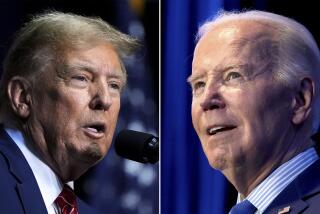Buchanan, Gramm Take Louisiana Battle to Wire
- Share via
BATON ROUGE, La. — GOP presidential rivals Patrick J. Buchanan and Sen. Phil Gramm of Texas battled down to the final hours Tuesday in Louisiana’s first-in-the nation and first-time-ever delegate selection caucuses.
At stake--along with 21 delegates--was the opportunity to get a head start in the Republican race by becoming the preeminent conservative challenger to the current front-runners, magazine publisher Steve Forbes and Sen. Bob Dole of Kansas.
Early returns from exit polls of voters indicated that Buchanan was defeating Gramm throughout the state.
Gramm once appeared to have an insurmountable advantage here, based on endorsements from the three Louisiana members of Congress who won election as Republicans. But in recent weeks, Buchanan has devoted most of his energies to ambushing Gramm. Late last week, he won the endorsement of the state’s newly elected Republican governor, Mike Foster.
“I find that I agree with Pat Buchanan more,” Foster said, in an endorsement that the Buchanan campaign quickly turned into a radio commercial. Foster cited the commentator’s opposition to abortion and gun control and his advocacy of ending lifetime appointments for federal judges.
In response, Gramm broke off his campaign in Iowa on Tuesday to fly to a series of stops in Lake Charles, Lafayette and Shreveport as the caucuses opened. In the meantime, the Texas senator shelled out cash he can ill afford to put a last-minute commercial on the air extolling his achievements on Capitol Hill.
Gramm has backed away from assertions that he would sweep all the state’s delegates, but, campaigning in Iowa before arriving here, he continued to say that he expected to win. “I’ve said from the beginning I thought I’d win, he told an audience at the Iowa Corn and Soybean Growers Assn.
“Buchanan says he has to win 10 delegates, if not he’d be disappointed. Eleven to 10 would still be victory, but it would be an awful lot like kissing your sister,” he added. “Now I’ve never had a sister, but I’m told it’s not exciting. So one of us is going to be disappointed.”
In addition to Gramm and Buchanan, Alan Keyes, the fiery anti-abortion crusader, has also campaigned here. Dole, Forbes and former Tennessee Gov. Lamar Alexander have all passed up the race, largely out of deference to the sentiments of Republicans in Iowa, who will pick their own delegates Monday and who jealously guard their role as holders of the first contest in the race.
Because Gramm and Buchanan have both said that the future of their candidacies could depend on how they do here, the Louisiana race has taken on importance far out of proportion to the number of people likely to vote. Even the governor, the day before the vote, admitted he did not know where his polling place is.
With only 42 polling places scattered across a state that stretches 380 miles from the Mississippi Delta to the borders of Texas and Arkansas, and with voting limited to only four hours--4 p.m to 8 p.m. CST--many Republican officials expected turnout to be only a tiny percentage of the 485,000 registered Republicans who are eligible.
At Robert E. Lee High School here, some 100 voters stood in line as the polling place opened. The one caucus at the school was supposed to accommodate voters from three congressional districts and 43 precincts.
Gramm clearly appeared better organized. His signs at the school outnumbered Buchanan’s by nearly 10 to 1. And inside the school gym, where voting booths were set up, those in line could see and hear Gramm making his pitch for their support on no fewer than three television monitors. Nearby was a table stacked with Buchanan literature and one video monitor on the table was dark and silent.
Patty Giurantano, a substitute elementary school teacher who volunteered to be a site coordinator for Gramm, said she “just fell in love with the things he had to say” when she heard Gramm speak a year ago. “When he talks about welfare reform, he talks with love and compassion.”
Edith Drew, a housewife, mother of five and grandmother of nine, said she backed Buchanan because she believes that in an election against Clinton he would be able to draw on “a wider spectrum of support” than Gramm--conservative Christians because of his opposition to abortion and his positions on other social issues and also erstwhile Perot voters, based on his opposition to NAFTA and militance on other trade issues.
Gramm’s Louisiana supporters created and promoted this contest, and he was widely conceded to have the advantage because of his backing from elected officials and the ties between Louisiana and Texas.
“If you had asked me about this two months ago, I would have said it was a slam dunk for us,” said Arizona Sen. John McCain, national chairman of Gramm’s presidential campaign.
But early in January, Forbes’ dramatic ascent in the polls put added pressure on both Gramm and Buchanan--making each candidate more anxious to eliminate the other from the race and turning Louisiana into a showdown.
Charlie Black, Gramm’s chief strategist, contended that by winning “all, or nearly all” of Louisiana’s 21 delegates, the senator could “insulate himself” against possible setbacks in Iowa and New Hampshire, allowing him to carry his candidacy into his natural base in the South and West.
But Buchanan decided that his own candidacy probably could not survive Gramm’s gaining such an advantage and threw himself and his resources into the race, outspending Gramm in television and radio advertising and putting in far more time than Gramm on the stump here.
Buchanan has brought to the state a message that combines an emphasis on social issues such as affirmative action and abortion with attacks on free trade aimed directly at Gramm, who has been a supporter of trade liberalization. These arguments evoked the economic populism once identified with the late Huey Long, the larger-than-life demagogue who dominated and shaped Louisiana politics back in the tumultuous years of the Great Depression.
“It was Buchanan’s message versus Gramm’s machine,” said Roy Fletcher, Buchanan’s media advisor in the state.
Gramm’s message, has been a combination of issues like budget-balancing and the assertion that he is the conservative candidate most likely to be able to win the nomination--a relatively tepid theme that has led to commercials that were “pretty mild,” according to Wayne Parent, Louisiana State University specialist in state government and politics. “All the buzz has been about Buchanan’s message,” Parent said.
McCain conceded as much. Buchanan’s rhetoric linking Gramm to corporate fat cats “probably appeals to more people than the balanced budget,” McCain said.
Gramm’s strategists ruled out launching a massive media effort to counter Buchanan because the resources could not be spared from other battlegrounds where Gramm is being heavily outspent by Forbes.
“We ain’t got the money,” McCain said.
Times staff writer Stephen Braun in Des Moines, Iowa, contributed to this story.
More to Read
Get the L.A. Times Politics newsletter
Deeply reported insights into legislation, politics and policy from Sacramento, Washington and beyond. In your inbox twice per week.
You may occasionally receive promotional content from the Los Angeles Times.









